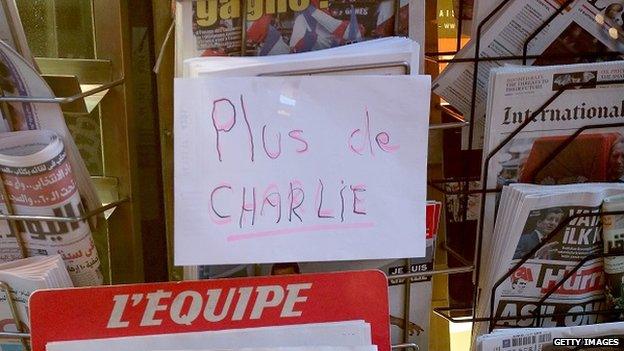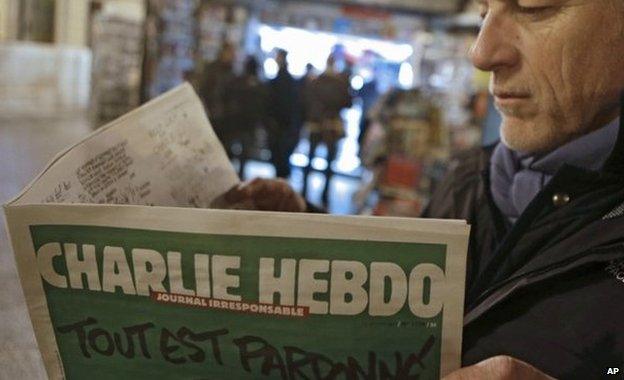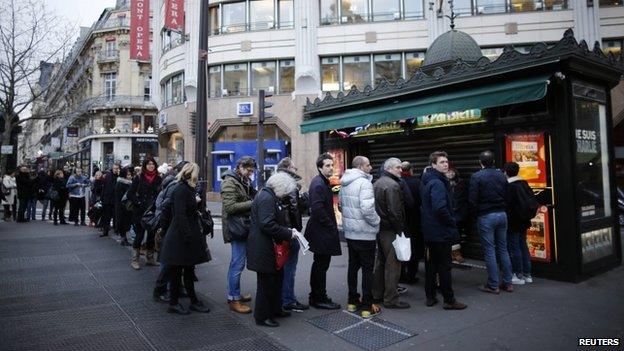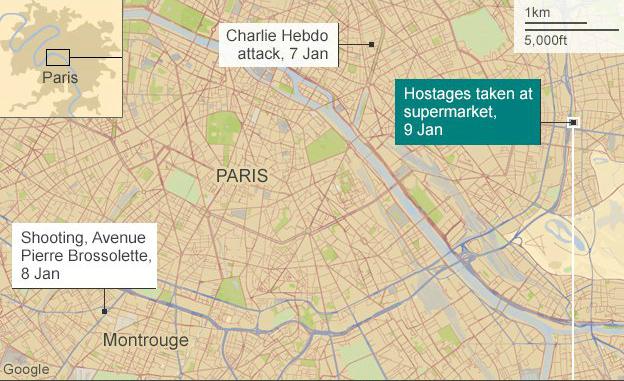Charlie Hebdo attacks: Hollande says magazine 'reborn'
- Published

The first run of copies of the magazine were sold out within hours
French President Francois Hollande has insisted Charlie Hebdo and its values will survive, after the new edition of the satirical weekly sold out in hours.
"Charlie Hebdo is alive and will live on," Mr Hollande said.
Millions more copies of the magazine are being printed because of demand.
It comes a week after Islamist gunmen murdered 12 people at its offices and five others in subsequent attacks. The new edition has angered some Muslims by depicting the Prophet Muhammad.
The cartoon shows the Prophet weeping while holding a sign saying "I am Charlie", and below the headline "All is forgiven".
"I am Charlie" emerged as a message of support for both the magazine and free speech following the attacks that started on 7 January.
The print-works was severely damaged by the fire-fight between police and the Kouachi brothers, as James Longman reports
The Afghan Taliban on Thursday denounced the latest cartoons. The militants "strongly condemn this repugnant and inhumane action," a Taliban statement quoted by AFP news agency said.
The group also praised last week's attacks.
Survivors' issue
Following the publication of Wednesday's Charlie Hebdo issue, President Hollande said: "You can murder men and women but you can never kill their ideas."
He said the magazine had been "reborn" in the week after the killings.

The planned run increased steadily this week - from one million to three million to five million

People waited for kiosks to open to buy the magazine
It will have a print run of five million issues this week, dwarfing the normal circulation of about 60,000.
The "survivors' issue", as the magazine calls it, is available in six languages including English, Arabic and Turkish. Proceeds are going to victims' families.
Eight journalists, including its editor, were killed in addition to four others when two brothers, Said and Cherif Kouachi, stormed Charlie Hebdo's offices in Paris on 7 January.
In a separate attack in the city two days later, an Islamist gunman killed four Jewish men and took hostages at a kosher shop.
The same attacker, Amedy Coulibaly, is believed to have shot a policewoman the day before.
'World fallen apart'
A video purportedly from al-Qaeda in Yemen (AQAP) said it planned and financed the Hebdo attack as "vengeance for the Prophet", but did not provide evidence to support its claims.
The gunmen are said to have used earlier publication of images of the Prophet as justification for their attack on the magazine.
AQAP had previously welcomed the assault, without acknowledging any role in the operation.
Soumya Kouachi's lawyer: "Her husband told her he was going to Paris to see his brother Cherif"
A lawyer for Said Kouachi's wife, Soumya, has told the BBC she had no idea he was an extremist. He said Kouachi had kissed his wife goodbye and told her he was visiting his brother, because he was unwell, just hours before the Charlie Hebdo attack.
"It's beyond her understanding, her world has fallen apart," the lawyer, Antoine Flasaquier, said.
Charlie Hebdo's decision to publish another cartoon of the Prophet drew threats from militant Islamist websites and criticism from the Islamic world.
The Islamic State (IS) militant group said it was "an extremely stupid act".
The release comes after millions - including dozens of world leaders - took part in a unity rally in Paris on Sunday.
Outside France, the Washington Post, Germany's Frankfurter Allgemeine, Corriere della Sera in Italy and the UK's Guardian are among publications that have shown the latest cartoon.
The BBC has published the image in a previous story and in a statement said: "We have made the editorial judgment that the images are central to reporting the story."

Why people are buying the magazine
Catherine Boniface, Paris: "This issue is symbolic, it represents their persistence, they didn't yield in the face of terror."
Read more: In the queue for Charlie Hebdo

French prosecutors have opened more than 50 cases against people accused of condoning terrorism or making threats to carry out terrorist acts.
Among those arrested on Wednesday was controversial French comedian Dieudonne M'bala M'bala, who was accused of "defending terrorism, external" after he likened himself to gunman Amedy Coulibaly.
He was released later on Wednesday but is to face trial at a later date, according to his lawyer.

How the attacks unfolded (all times GMT)

Wednesday 7 January 10:30 - Two masked gunmen enter Charlie Hebdo offices, killing 11 people, including the magazine's editor. Shortly after the attack, the gunmen kill a police officer nearby.
11:00 - Police lose track of the men after they abandon their getaway car and hijack another vehicle. They are later identified as brothers Said and Cherif Kouachi.
Thursday 8 January 08:45 - A lone gunman shoots dead a policewoman and injures a man in the south of Paris. Gunman later identified as Amedy Coulibaly.
10:30 - The Kouachi brothers rob a service station near Villers-Cotterets, in the Aisne region, but disappear again.
Friday 9 January 08:30 - Police exchange gunfire with the Kouachi brothers during a car chase on the National 2 highway northeast of Paris.
10:00 - Police surround the brothers at an industrial building in at Dammartin-en-Goele, 35km (22 miles) from Paris.
12:15 - Coulibaly reappears and takes several people hostage at a kosher supermarket in eastern Paris. Heavily armed police arrive and surround the store.
16:00 - Kouachi brothers come out of the warehouse, firing at police. They are both shot dead.
16:15 - Police storm the kosher supermarket in Paris, killing Coulibaly and rescuing 15 hostages. The bodies of four hostages are recovered.
